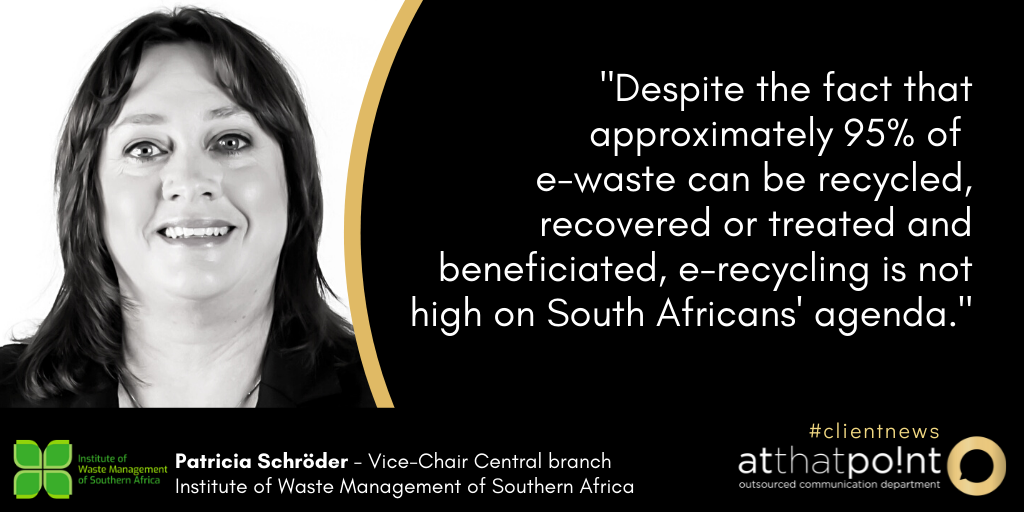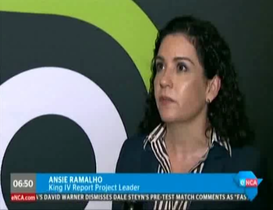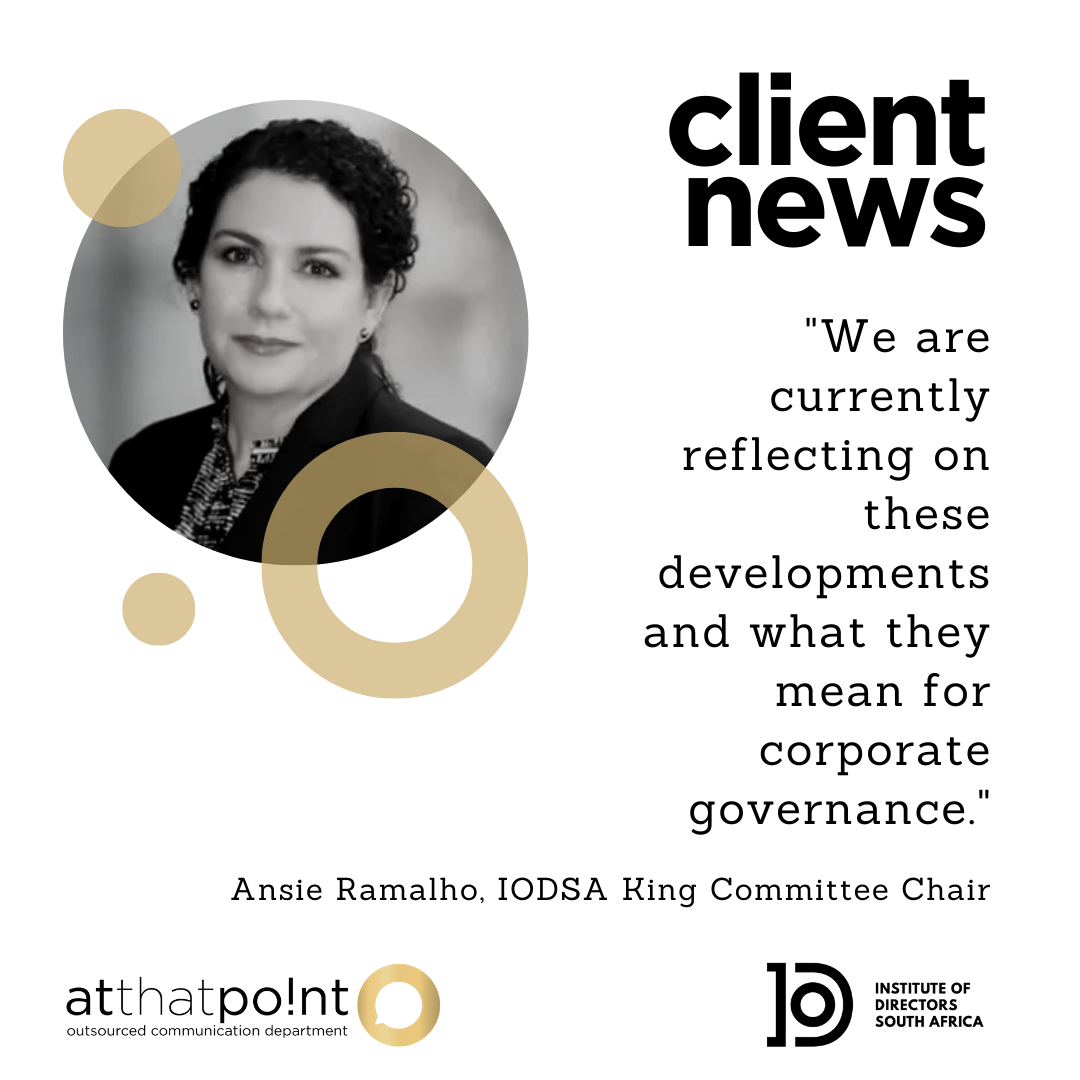|
Much has changed since King IV came into effect on 1 April 2017 but, says the chair of the King Committee, Ansie Ramalho, its principles and practices are expressed at a sufficiently high level of generality to empower boards to apply them in the current circumstances.
“There have been a number of developments in the past few years that will influence how organisations are led and governed over the next decade and beyond,” says Ramalho. “We are currently reflecting on these developments and what they mean for corporate governance, and whether additional clarity or guidance might be required. At this stage, though, we believe that any update of King IV would be premature—especially given the ongoing developments relating to global reporting requirements and standards, as well as the pending Companies Act Amendment Bill.” One of the developments currently being debated by the King Committee is recent rapid advances in artificial intelligence and technology generally, which raise significant, complex risks and ethical issues. At a global level, regulations and standards that deal with sustainability disclosure by companies are also being introduced at an unprecedented speed. Environmental, social and governance (ESG) issues are re-emphasising the focus on the organisation’s purpose and are affecting corporate reporting and disclosure significantly. Human capital governance has become more complex as a new generation of employees enters the corporate world with a novel set of expectations, while the way organisations are run has changed significantly as working habits change in response to the COVID-19 lockdowns. Board composition is also a developing area, with consideration being given to greater stakeholder representation or other suitable mechanisms to enrich decision-making. In the South African context, the Companies Act Amendment Bill looks set to introduce significant amendments to the current Act. The Bill was issued for public comment in 2021, but no final version has yet appeared. However, its proposed provisions for strengthening oversight by social and ethics committees of companies’ social and environmental performance, its introduction of accountability mechanisms for the wage gap, and shareholder voting on remuneration are all clear signals of the prevailing mood, as is the cautionary statement in the Bill’s explanatory memorandum that regulation to include employees in governance structures is to follow. In the wake of the Zondo reports, the country’s greylisting and current geo-political concerns, South African organisations are particularly affected by governance issues relating to corruption, including money laundering, terrorism, and transparency regarding the true owners of a company. King IV unequivocally maintains that operating context needs to be accounted for in strategy development, risk management, performance and reward systems and reporting, but the balancing act is becoming increasingly difficult, says Ramalho. Businesses are increasingly being expected not only to mitigate external risks but to contribute proactively to not only the economies in which they operate but also the health of society and the planet. The move to incorporate ESG factors into investment decisions shows that so-called “non-financial” factors ultimately have financial consequences. Investors are increasingly taking into account the context in which a company operates. This balancing act between financial and non-financial factors is particularly difficult for South African companies. In the interests of their own survival, they are increasingly having to step into gaps created by the government’s inability to deliver key services. To attract investment, South African companies will need to demonstrate that they are able to survive in an overall environment which is fraught with threats and vulnerabilities, Ramalho believes. “I would like to assure all our stakeholders that the King Committee is keeping abreast of the evolving corporate governance trends and has been considering their potential impact on the King IV Report. While any formal update is premature at this stage, we stand ready to offer South African organisations any further insights or guidance that may be required as these trends unfold. We also envisage that this process will include stakeholder engagement,” she says. “The King Committee reaffirms its belief that corporate governance does not exist for its own sake, but as a way of building resilient and healthy companies that are fit for this complex operating context.” ENDS MEDIA CONTACT: Stephné du Toit, [email protected], 084 587 9933, www.atthatpoint.co.za For more information on the IoDSA please visit: Website: www.iodsa.co.za Twitter: @The_IoDSA LinkedIn: Institute of Directors South Africa Company Page Facebook: Institute of Directors South Africa
0 Comments
 Cricket South Africa (Cricket SA) has lurched into yet another crisis with the Members’ Council rejecting the interim board’s proposal that the new board be composed of a majority of independent directors. The move by the Council goes against widely-accepted international best practice, including the King IV Code on Corporate Governance, and is probably indicative of the lack of trust between the Members’ Council and the Cricket SA board, says Ansie Ramalho, Technical Facilitator at the Institute of Directors in South Africa and Chair of the King Committee on Corporate Governance in South Africa. “The challenge that Cricket SA faces is common in the non-profit sector, small businesses and even some state-owned entities, where boards are often dominated by representatives of key stakeholders such as donors, communities, beneficiaries or investors. Stakeholder representivity might seem like a good idea as it gives stakeholders a say at the highest level, but in fact it is not ideal,” she explains. “Directors have a primary duty to the organisation itself—in this case Cricket SA—and not to the Members’ Council or other stakeholder groupings. Usually, the interests of the organisation and its key stakeholders are aligned but there are situations in which the short-term interests of a particular stakeholder may conflict with longer-term considerations relating to the organisation’s sustainability. So-called representative directors are often mandated to promote a particular agenda at the board which also increases the potential for conflicts of interests.” For this reason, good governance practice for a company such as Cricket SA would be to have a majority of independent non-executive directors who are better placed to take a more objective view of issues, and to put the interests of the organisation first. This was also a recommendation by the Nicholson Commission of Enquiry in its 2012 report on maladministration at Cricket SA. Ms Ramalho also argues that there is a good case to be made for the appointment of professional, career directors who have the governance and oversight skills necessary to discharge their fiduciary duties competently. The dilemma of non-executive directors is that they do not have the benefit of day-to-day knowledge of the organisation, and thus suffer from a “knowledge deficit” when compared with executives. “Being an expert at wielding the tools of governance and oversight compensates for the asymmetry of information between non-executive directors and executives. Merely representing a stakeholder grouping or having had a successful career as an executive are not in themselves adequate for offering rigorous and objective oversight,” she says. “If the directors are not sufficiently independent and fully qualified to offer oversight and look after the organisation’s long-term interests, the whole system of checks and balances is rendered ineffectual.” Ms Ramalho suggests that, the primary focus of the Members’ Council should be to ensure that Cricket SA has the best possible board, composed of directors with the ability to hold management to account competently and without bias. It is after all ultimately the responsibility of Members’ Council to elect the board members and it is therefore within its power to insist on a rigorous selection process that delivers this outcome. “That is the only way to ensure Cricket SA is governed with its long-term interests—and the interests of the game as a whole—at the forefront,” she urges. King IV shifts focus to outcomes and accessibility Ansie Ramalho, King IV Project Lead, speaking at a press conference in Johannesburg on 31 October 2016 Ansie Ramalho, King IV Project Lead, speaking at a press conference in Johannesburg on 31 October 2016 The King IV Report on Corporate GovernanceTM (King IV) was launched on 1 November 2016 by the King Committee and the Institute of Directors in Southern Africa (IoDSA), which owns the intellectual rights to the King Reports and the governance codes they contain. The King Reports, of which this is the fourth iteration, contain the philosophy, principles and leading practices for corporate governance in South Africa. “The overarching objective of King IV is to make corporate governance more accessible and relevant to a wider range of organisations, and to be the catalyst for a shift from a compliance-based mindset to one that sees corporate governance as a lever for value creation ,” says Prof Mervyn King, chair of the King Committee on Corporate Governance in South Africa. To make the Report more accessible, Ansie Ramalho, King IV Report Project Lead for the IoDSA, and the task team appointed by the King Committee, have introduced a number of innovations. They have broadened the language of the Report, ensuring that the vocabulary is no longer listed company and business-specific, and have provided supplements to make it easier to adapt the Code to different industry sectors, including government and non-profits, and various organisation types. King IV also provides guidance on how to apply its practices proportionally, in line with an individual organisation’s size and resources, and the extent and complexity of its activities. In addition, King III’s 75 principles have been reduced to a mere 16 in King IV, with an additional 17th principle which is applicable to institutional investors such as retirement funds and insurance companies. At a deeper level, King IV has taken the decisive step of focusing on outcomes as a way of driving acceptance of corporate governance as integral to value creation by organisations characterised by an ethical culture, good performance, effective control and legitimacy. Linking governance to outcomes should result in organisations practising quality governance. In this spirit, King IV emphasises not what practices have been implemented but rather what their impact has been on achieving the 16 principles. King IV has moved the regimen of “apply or explain” to “apply and explain”. “Apply and explain” introduces a qualitative approach to the implementation of King IV’s recommendations. Governing bodies now have greater flexibility in how they implement the recommended practices to achieve the goals articulated in the principles, but they have to be transparent about how they did so. The intent is for the reader of the explanation to be able to make an informed decision about whether the organisation has or has not achieved the principles and realised the four outcomes of ethical culture, performance in a sustainable manner, effective controls and legitimacy. Other important issues covered by King IV include the wage gap, shareholders voting on remuneration policies and their implementation so as to trigger engagement with the company and the composition of the governing body. “King IV is the product of wide consultation, and belongs to all South Africans – organisations and individuals – to whom good governance matters,” says Ramalho. “The wish of the King Committee and the IoDSA is that King IV be welcomed as making it easier to understand what the purpose of corporate governance is, and to apply it to achieve the creation of value. King IV aims to make corporate governance understandable beyond the circle of consultants, technicians and academics. Prof King said it would be the committee’s greatest reward if King IV is adopted by all organisations across all sectors with a consequent consistent practice of quality governance. King IV will be available via app download from App Store or Galaxy App Store, or via a digital read-only copy from www.iodsa.co.za. Printed copies will be available for purchase through Lexis Nexis. ENDS MEDIA CONTACT: Cathlen Fourie, 082 222 9198, [email protected], www.atthatpoint.co.za For more information on the IoDSA please visit: Website: www.iodsa.co.za Twitter: @The_IoDSA LinkedIn: The Institute of Directors in Southern Africa group  The Institute of Directors in Southern Africa (IoDSA) and the King Committee have made the draft version of the latest King Report—King IV—available for public comment today. Those wishing to comment will be able to access the document via an electronic portal, which will also provide a mechanism for submitting comments. The King Committee under the leadership of Prof Mervyn King and the King IV task team, led by Ansie Ramalho, the former CEO of the IoDSA, have been working on the new document since late 2014. Ramalho says that a number of developments in corporate governance made a new version necessary. Among these developments are the increased focus on executive remuneration; the key role of social and ethics committees, the regulations for which only came out after the launch of King III; and the continuing development of Integrated Reporting, which was first recommended in King III. “The King Codes have helped make South Africa a global leader in corporate governance—subjecting King IV to the rigor of public comment is thus important,” says Prof Mervyn King. “King IV breaks new ground by offering an integrated approach to corporate governance encompassing the economic, social and environmental spheres as well. It also impacts on sectors other than listed or large companies such as state-owned enterprises, local government, non-profits, SMEs and retirement funds, among others. Quality and effective corporate behaviour offers a way out of many of our current economic and sustainable development challenges.” King IV differs from King III in a number of ways. The Code is now integrated into the Report, with a clear differentiation between principles and practices, with the latter linked to outcomes—these and other innovations are designed to make it easier to use. Especially noteworthy, King III’s “apply or explain” has become “apply and explain”. The intention here, Ramalho explains, is to help organisations move beyond a compliance mind-set to describing how implemented practices advance progress towards giving effect to each principle - the application of which is assumed due to it being basic to good governance. The process of obtaining public comment will take place over two phases. The current first phase will cover the King IV Report (bar the Sector Supplements), which sets out philosophy, concepts and the foundational principles. Comment on the Sector Supplements, which are dependent on the main report, will be sought in phase two. While the main report is in the public domain for comment, this approach will allow Ramalho’s team will solicit further specialist comment on the sector supplements before they are released for public comment. The main report has already had the benefit of comment from institutional members of the King IV Committee, corporate governance specialists, directors, preparers, users and academics. “Too many people see corporate governance as a compliance issue whereas it is actually a critical tool for strengthening all our public and private institutions, to the benefit of the whole economic system. The overriding message of King IV is that good corporate governance practices help any organisation improve its ability to sustain itself and the social and environmental context in which it operates. The process of public input will also help to drive buy-in across the various stakeholder communities,” concludes Ramalho. “The more difficult the external circumstances are, the more valuable a strong corporate governance culture is.” Any member of the public may comment, either in a personal capacity or on behalf of an organisation. Comments may be made on any aspect of the Report, but the drafting committee has also posted a list of questions to which it would particularly value input. However, no anonymous contributions will be entertained, and the details of each commentator and their comments will be in the public domain. The comment period for each of the two phases is two months. ENDS MEDIA CONTACT: Cathlen Fourie, 082 222 9198, [email protected], www.atthatpoint.co.za For more information on the IoDSA please visit: Website: www.iodsa.co.za Twitter: @The_IoDSA LinkedIn: The Institute of Directors in Southern Africa group |
Archives
July 2024
Categories
All
|


 RSS Feed
RSS Feed